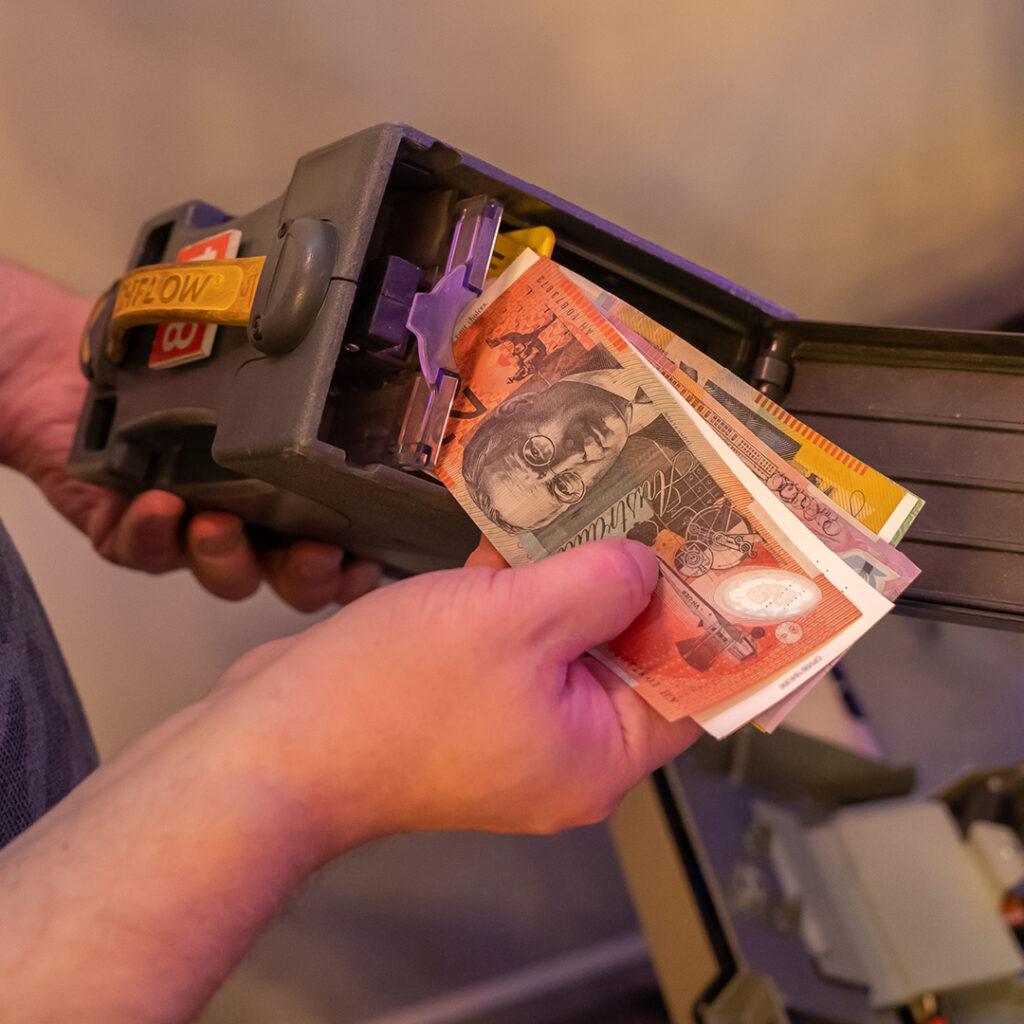Cash handling remains one of the most complex and critical aspects of running a pub or club. While society is shifting rapidly towards digital payments, cash still underpins key parts of hospitality, especially gaming operations. For venue managers, the challenge is how to manage this paradox: a declining but still essential payment method that requires significant resources, attention and risk management.
Why Cash Still Matters
Although card and mobile payments dominate everyday purchases, cash remains embedded in the fabric of pubs and clubs. ATMs, Cash Redemption Terminals (CRTs) and gaming machines all rely on steady reserves of notes. Regulations, such as the $500 cash insertion rule for new EGMs in NSW, means that venues should have sufficient cash on hand to meet customer expectations and compliance requirements.
For many patrons, particularly older generations, cash also feels more tangible and trusted. It provides control and visibility over spending, which is especially important in gaming environments where responsible conduct is paramount. Venues that remove or limit cash risk alienating an important segment of their customer base.
The Challenges of Cash Handling
Managing large volumes of cash brings unique pressures for venue managers:
- Security Risks: Cash is vulnerable to theft, fraud and error. Strong controls are required to protect both staff and patrons.
- Labour Intensity: Manual counting, reconciliation and transfers consume significant staff time and introduce opportunities for mistakes.
- Compliance Obligations: Cash handling must be transparent, auditable and compliant with anti-money laundering (AML) and gaming regulations.
- Operational Costs: Holding large amounts of cash ties up working capital and incurs costs in replenishment and secure transport.
- Safekeeping: Holding cash securely within your venue is paramount, it provides financial resilience and eliminates opportunistic theft.
In short, cash management is resource-heavy. Without efficient systems and processes, it can quickly eat into margins and distract staff from customer-facing roles.
Smarter Systems, Safer Processes
Technology has significantly improved how venues handle cash. Devices such as cash recyclers, CRTs and secure cashier safes have streamlined the process, reducing manual workload and improving accuracy. Automated reconciliation systems now allow managers to track transactions in real-time, cutting down on the long hours once spent balancing tills and preparing deposits.
Integration is key. Platforms that connect ATMs, gaming systems, and reporting software ensure that data flows seamlessly across the venue. This reduces duplication, creates a stronger compliance trail and gives managers clearer oversight of cash movements throughout the business.
Balancing Cash and Cashless
The real challenge for the future lies in balance. On one hand, digital payments and cashless trials are reshaping expectations, particularly among younger patrons who may not carry physical currency at all. On the other, cash remains critical to gaming operations and for many patrons’ peace of mind.
Venues that thrive will be those that cater to both groups. This means continuing to maintain cash reserves and efficient systems while also preparing for a gradual transition towards cashless alternatives. Offering choice, whether it’s tap-and-go, mobile wallet, or cash at the bar, ensures inclusivity and flexibility.
Best Practices for Venue Managers
To handle cash more effectively, pubs and clubs should focus on:
- Investing in secure cash-handling technology to reduce risk and labour costs.
- Standardising systems across venues to simplify training and reduce errors.
- Embedding compliance into everyday operations with audit-ready processes.
- Integrating data platforms for real-time oversight of cashflow and performance.
- Preparing for a dual future where both cash and cashless coexist for some time.
The Way Forward
Cash may be in decline, but it is far from disappearing. For the foreseeable future, it will remain central to the operations of pubs and clubs, particularly in gaming. The venues that succeed will be those that manage cash more efficiently, reduce the risks and costs attached to it and prepare for the day when cash and digital coexist in equal measure.
Operational efficiency in cash handling is no longer just a back-office task. It is a core part of running a resilient, compliant and customer-focused venue and one that will continue to shape the future of Australia’s pubs and clubs.


